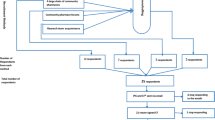Abstract
Background In the past decade, there has been an increase in prescription opioid related harms. These include dependence, non-fatal and fatal overdose. Pharmacists play a an important role in safe opioid supply. As most opioids are supplied through pharmacies, pharmacists are in a prime position to reduce harms associated with opioid use. Development of specific core competencies for pharmacists may facilitate consistent and safer opioid supply. Objective To reach consensus on which competency items identified by the Association of Faculties of Pharmacy of Canada’s Opioid Working Group are considered core competencies for Australian pharmacists in opioid supply and assess expert pharmacists’ perceptions of how well these competencies are currently met by practicing pharmacists. Setting Expert pharmacists in the area of opioid supply from across Australia. Method A series of questionnaires were presented to Australian opioid expert pharmacists via a modified Delphi study, with the aim to reach consensus on which items should be considered competencies for opioid supply by Australian pharmacists. Items were rated on a 6-point Likert scale and analysed using Statistical Package for the Social Sciences® (SPSS). Participants were also asked to rate how well they perceived that currently practicing pharmacists met each of these competency items. Main outcome measure Consensus on competency items for pharmacists when supplying prescribed opioids. Results All competency items presented to participants reached immediate agreement. When rating whether participants perceived currently practicing pharmacists met these competencies, results were variable. The competencies that participants rated practicing pharmacist met to a higher degree reflected knowledge and skills items that can be applied to all medications and were not opioid specific. The lower rated competencies appeared to be related to newer or more complex or specialised areas of opioid supply. Conclusion There was strong agreement by participants on what should be considered core competencies for Australian pharmacists in opioid supply. Given the large number of items identified, further research may help determine priorities for training and education.

Similar content being viewed by others
References
Special Advisory Committee on the Epidemic of Opioid Overdoses. National report: Apparent opioid-related deaths in Canada (January 2016 to March 2019). Ottawa: Public Health Agency of Canada; 2019
Pezalla EJ, Rosen D, Erensen JG, Haddox JD, Mayne TJ. Secular trends in opioid prescribing in the USA. J Pain Res. 2017;10:383–7.
United Nations publication. World Drug Report 2019. 2019.
Lalic S, Ilomaki J, Bell JS, Korhonen MJ, Gisev N. Prevalence and incidence of prescription opioid analgesic use in Australia. Br J Clin Pharmacol. 2019;85(1):202–15.
Roxburgh A, Dobbins T, Degenhardt L, Peacock A. Opioid‐, amphetamine‐, and cocaine‐induced deaths in Australia: August 2018. Sydney: National Drug and Alcohol Research Centre, University of New South Wales; 2018 12/5/19]. Available from: https://ndarc.med.unsw.edu.au/sites/default/files/ndarc/resources/How%20to%20guide%20Drug%20Induced%20deaths%20Drug%20Trends%20Bulletin.pdf
Roxburgh A, Hall WD, Gisev N, Degenhardt L. Characteristics and circumstances of heroin and pharmaceutical opioid overdose deaths: comparison across opioids. Drug Alcohol Depend. 2019;205:107533.
National Advisory Committee on Prescription Drug Misuse. First do no harm: responding to Canada’s prescription drug crisis. Ottawa: Canadian Centre on Substance Abuse; 2013 [Available from: http://www.ccsa.ca/Resource%20Library/Canada-Strategy-Prescription-Drug-Misuse-Report-en.pdf
Sproule B. AFPC commitment to the joint statement of action to address the opioid crisis in Canada. Ottawa: Association of Faculties of Pharmacy of Canada; 2018.
Australian Institute of Health and Welfare. Opioid harm in Australia and comparisons between Australia and Canada. Canberra: AIHW; 2018.
Pharmaceutical Society of Australia Ltd. National Competency Standards Framework for Pharmacists in Australia. Deakin West: Pharmaceutical Society of Australia Ltd.; 2016 [8/5/2019]. Available from: https://www.psa.org.au/wp-content/uploads/2018/06/National-Competency-Standards-Framework-for-Pharmacists-in-Australia-2016-PDF-2mb.pdf.
Powell C. The Delphi technique: myths and realities. J Adv Nurs. 2003;41(4):376–82.
Hasson F, Keeney S, McKenna H. Research guidelines for the Delphi survey technique. J Adv Nurs. 2000;32(4):1008–15.
Diamond IR, Grant RC, Feldman BM, Pencharz PB, Ling SC, Moore AM, et al. Defining consensus: a systematic review recommends methodologic criteria for reporting of Delphi studies. J Clin Epidemiol. 2014;67(4):401–9.
Hsu C-C, Sandford BA. The Delphi technique: making sense of consensus. Pract Assess Res Eval. 2007;12(10):1–8.
Ludwig B. Predicting the future: have you considered using the Delphi methodology? J Exten. 1997;35(5):1–4.
Australian Institute of Health and Welfare. Opioid harm in Australia and comparisons between Australia and Canada Canberra: Australian Institute of Health and Welfare; 2018 [7/5/2019]. Available from: https://www.aihw.gov.au/getmedia/605a6cf8-6e53-488e-ac6e-925e9086df33/aihw-hse-210.pdf.aspx?inline=true.
Spark MJ, Willis J. Application of cognitive interviewing to improve self-administered questionnaires used in small scale social pharmacy research. Research in Social and Administrative Pharmacy. 2014;10(2):469–74.
Keeney S, Hasson F, McKenna HP. A critical review of the Delphi technique as a research methodology for nursing. Int J Nurs Stud. 2001;38(2):195–200.
Gregory T, Gregory L. The role of pharmacists in safe opioid dispensing. J Pharm Pract. 2019:0897190019852803.
Murphy L, Babaei-Rad R, Buna D, Isaac P, Murphy A, Ng K, et al. Guidance on opioid tapering in the context of chronic pain: evidence, practical advice and frequently asked questions. Can Pharm J. 2018;151(2):114–20.
James JR, Scott JM, Klein JW, Jackson S, McKinney C, Novack M, et al. Mortality after discontinuation of primary care-based chronic opioid therapy for pain: a retrospective Cohort study. J Gen Intern Med. 2019;34(12):2749–55.
Clifford RM, Plumridge RJ. Developing key competencies for a clinical pharmacy education and peer review program. J Pharm Pract Res. 2003;33(3):208–11.
Pharmaceutical Society of Australia Ltd. PSA Professional Practice Standards Tool Deakin West: Pharmaceutical Society of Australia; 2019. Available from: https://www.psa.org.au/pps/.
Acknowledgements
The researching team would like to extend our gratification to Beth Sproule and the Association of Faculties of Canada’s Opioid Working Group for their aid in the conduction of this project.
Funding
None.
Conflicts of interest
There are no conflicts of interest to declare.
Author information
Authors and Affiliations
Corresponding author
Additional information
Publisher's Note
Springer Nature remains neutral with regard to jurisdictional claims in published maps and institutional affiliations.
Electronic supplementary material
Below is the link to the electronic supplementary material.
Rights and permissions
About this article
Cite this article
Maher, E., Nielsen, S., Summers, R. et al. Core competencies for Australian pharmacists when supplying prescribed opioids: a modified Delphi study. Int J Clin Pharm 43, 430–438 (2021). https://doi.org/10.1007/s11096-020-01060-x
Received:
Accepted:
Published:
Issue Date:
DOI: https://doi.org/10.1007/s11096-020-01060-x



